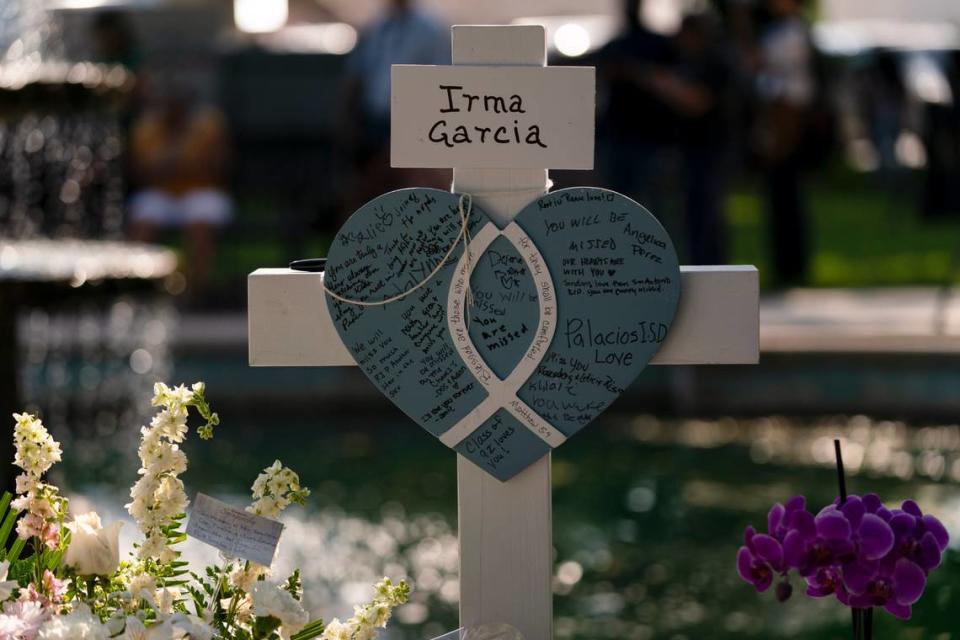Family: Slain Texas teacher’s husband died of ‘broken heart.’ Science says that’s possible
When people heard Thursday that Joe Garcia died in Uvalde, Texas, stunned relatives and community members and scores of others expressing shock and sympathy on social media quickly pronounced a cause of death.
Joe died of a broken heart.
His high school sweetheart and wife of more than two decades, Irma, was one of two teachers massacred inside Robb Elementary School alongside 19 students on Tuesday. And now Joe was dead, too, just two days later.
“I truly believe Joe died of a broken heart and losing the love of his life of more than 25 years was too much to bear,” Irma’s cousin, Debra Austin, wrote on a GoFundMe page.
Joe, who was 50, had just returned home from leaving flowers at a makeshift memorial for Irma Thursday morning when he suddenly collapsed while sitting at the kitchen table with family members, his nephew, John Martinez, told the USA TODAY Network. He could not be revived.

Though no official cause of death has been reported, science tells us that, though it is rare, “broken hearts” can indeed be fatal.
Broken heart syndrome is technically stress cardiomyopathy or “takotsubo syndrome.” It’s a temporary heart condition first described in 1990 by doctors in Japan who encountered patients who seemed to be having heart attack symptoms, but not heart attacks.
Researchers at Cedars-Sinai in Los Angeles, Cleveland Clinic and Johns Hopkins in Baltimore are tracking a recent uptick in cases, which they say might have been caused by the stress of the pandemic, though it’s too early to tell.
A Cleveland Clinic study found cases of the disease have grown anywhere from less than 2% to 7.8% during COVID-19.
“Families are extremely stressed by deaths of loved ones, and by losing jobs and homes,” Dr. C. Noel Bairey Merz, director of the Barbra Streisand Women’s Heart Center at Cedars-Sinai’s Smidt Heart Institute, said earlier this year.
“Our own studies of Takotsubo syndrome indicate it was already on the rise before the COVID-19 pandemic, partly because it’s better recognized than it used to be.”
It can happen to anyone, healthy people too, when sudden, acute stress sends stress hormones like adrenaline storming into the heart, stunning it and quickly weakening the left ventricle, the heart’s main pumping chamber, preventing it from contracting normally.
The Japanese doctors who discovered the condition named it after a pot-shaped vessel used to trap octopus — “takotsubo” — because that’s what the ballooning left ventricle looks like when it fills with blood.
Researchers have identified two types of stress as common causes, cardiologist Dr. Ilan Wittstein, director of the Advanced Heart Failure Fellowship and assistant professor of medicine at John Hopkins School of Medicine, explains on the school’s website.
He has called the syndrome “unique” because an emotional stressor so quickly weakening the heart muscle is an unusual cause-and-effect.
Physical stress — a stroke, seizure, high fever, exercise, running to catch a flight at the airport — can cause it.
So can emotional stress — grief, shock, extreme anger, all emotions that have flooded social media since the shooting Tuesday. Joe was not alone in his grief.
Many people who suffer the condition have experienced a stressful event such as losing a loved one, hence the sorrowful name of broken heart syndrome.
The main symptoms are chest pain and shortness of breath, similar to heart attack warnings, that can begin within minutes or even hours after an emotionally or physically draining event.
Anyone who experiences those symptoms, or a rapid or irregular heartbeat, after a stressful event needs to call 911 immediately.
Broken heart syndrome typically affects more women than men. More than 90% of reported cases occur in women ages 58 to 75, according to Harvard Medical School.
It is treatable and most people who experience it make a full recovery within weeks, according to the American Heart Association.
But that doesn’t always happen.
The Garcias leave behind four children, according to Irma’s teacher profile on the Uvalde school district website where she greeted her new students at the beginning of the year with a cheerful “hello boys and girls!”
She was just two days away from finishing her 23rd year of teaching, all of them at Robb Elementary.
She wrote that her and Joe’s oldest child, Cristian, was completing Marine boot camp while his brother, Jose, studied at Texas State University. Their daughter, Lyliana, was a high school sophomore this year and their youngest, Alysandra, a seventh-grader.
As of Friday morning more than $2 million had been raised for the family through the GoFundMe campaign.
Among hundreds of strangers sending condolences to the family, Joe is now mourned as the massacre’s 22nd victim.

